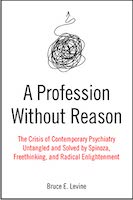Some Psychiatrists Distancing Themselves from Profession as Drug Company Dominance Makes Some Shrinks Very Rich, and Many Patients Over Drugged
What does it tell us about the state of psychiatry when some of the biggest names in the psychiatric establishment are distancing themselves from psychiatry’s diagnostic system and its treatments? In 2013, National Institute Mental Health (NIMH) director Thomas Insel, citing the lack of scientific validity of psychiatry’s official diagnostic manual, the DSM, stated that […]
Meeting the Needs of the Power Structure
In the history of authoritarian governance, there have always been ruling power structures that use professionals to meet its needs, and today’s corporatocracies claim the profession of mental health as a powerful means to maintain the status quo.
Psychiatry Admits Its Been Wrong in Big Ways, But Can It Change? A Chat with Robert Whitaker
Since interviewing Robert Whitaker for AlterNet in 2010, after the publication of Anatomy of an Epidemic, the psychiatry establishment has pivoted from first ignoring him, to then debating him and attempting to discredit him, to currently agreeing with many of his conclusions. I was curious about his take on the recent U-turns by major figures in the psychiatry establishment with respect to (1) antipsychotic drug treatment, (2) the validity of the “chemical imbalance” theory of mental illness, and (3) the validity of the DSM, psychiatry’s diagnostic bible. And I was curious about Whitaker’s sense of psychiatry’s future direction.
Psychiatry Now Admits It’s Been Wrong in Big Ways — But Can It Change?
When I interviewed investigative reporter Robert Whitaker in 2010 after the publication of his book Anatomy of an Epidemic: Magic Bullets, Psychiatric Drugs, and the Astonishing Rise of Mental Illness in America, he was not exactly a beloved figure within the psychiatry establishment. Whitaker had documented evidence that standard drug treatments were making many patients worse over […]
DAILY KOS Interview: Case Studies in Activism #67: Battling Big Pharma and Rehumanizing Mental Health Treatment
Why Do Some Americans Speak So Confidently When They Have No Clue What They’re Talking About?
The Harvard Business School (HBS) information session on how to be a good class participant instructs, “Speak with conviction. Even if you believe something only fifty-five percent, say it as if you believe it a hundred percent,” reports Susan Cain in her best-selling book Quiet (2013). At HBS, Cain noticed, “If a student talks often and […]
Leadership Training or Bullshit Training at Harvard? The Price of Pseudo-Certainty in Business, Government, and Medicine
The Harvard Business School (HBS) information session on how to be a good class participant instructs, “Speak with conviction. Even if you believe something only fifty-five percent, say it as if you believe it a hundred percent,” reports Susan Cain in her best-selling book Quiet (2013). At HBS, Cain noticed, “If a student talks often and […]
The Normalization of Greed, Hustle, and Money-Centrism
New York Times “Room for Debate Question”: “Why We Like to Watch Rich People: Why do American television and movie audiences like to watch the antics and questionable behavior of the 1 percent?” The lives of the outlandishly rich are so unreal and so bizarre for most of us that watching their self-indulgence, careless spending, […]
Greed and Hustle Have Become Virtues
New York Times “Room for Debate Question”: “Why We Like to Watch Rich People: Why do American television and movie audiences like to watch the antics and questionable behavior of the 1 percent?” The lives of the outlandishly rich are so unreal and so bizarre for most of us that watching their self-indulgence, careless spending, […]




